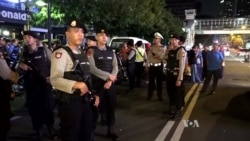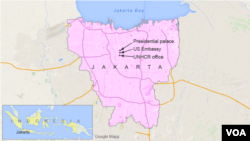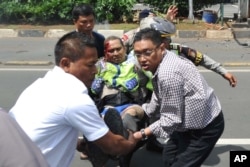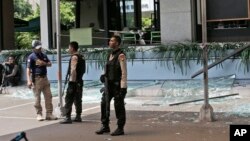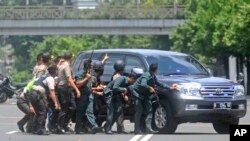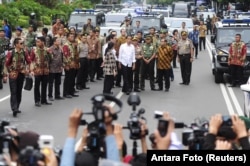Islamic State has claimed responsibility for Thursday's coordinated bomb and gun attack in the Indonesian capital that left seven people dead, including all five attackers.
The Islamic State-linked Aamaq News Agency says the attack in an upscale neighborhood in central Jakarta "targeted foreign nationals and security forces charged with protecting them." Foreigners were among 20 people who were wounded.
Earlier, Indonesian national police spokesman Anton Charliyan said an IS-affiliated group was probably behind the assault, and the attackers were likely trying to imitate the November Paris terror attacks.
The Jakarta police chief went further, naming an Indonesian in Syria as responsible. “All leaders of Islamic State in Southeast Asia are competing to be the regional chief," Tito Karnavian told reporters. "That’s why [Indonesian IS fighter] Bahrun Naim plotted this attack."
Watch video of the blast and aftermath:
The violence began with a series of explosions mid-morning in an area near a shopping center, luxury hotels, embassies and other office buildings. The first two occurred in the outdoor smoking area and a parking lot of a Starbucks. A third explosion rocked a small police station.
The militants engaged in intense gun battles with police throughout the day. By late afternoon, authorities declared the attack over, saying all five militants were killed. A Canadian national and an Indonesian citizen were also killed, police said.
Busy spot
"This is a very popular shopping area with restaurants and office buildings. About 50 meters from there is the United Nations office. The U.S. Embassy is almost around 400 or 500 meters from there, not far from the presidential palace, actually. So this is a really centrally located place," said VOA Indonesian Service reporter Frans Demon.
While clearing Tamarin Avenue where the attacks occurred, police say they found one large and five small unexploded bombs. It is not clear why the bombs did not go off.
Indonesian authorities in November had received a threat from Islamic State about a coordinated bomb attack in the capital.
"Around Christmas and New Year's there was a threat by this group [IS] that they will do what they call a 'concert' in Jakarta, meaning they will set off bomb explosions in several places at the same time," said Demon.
A heavy police presence now on the streets of Jakarta is aimed at reassuring citizens. Zainal Arifin hopes that it will also stop future attacks. “Jakarta’s citizens, including myself, are now scared to go to shopping malls and other public places. But the police say we have nothing to fear because they’ll protect us. Hopefully this won’t happen again,” he said.
Another IS external attack
A U.S. counterterrorism official told VOA there was no reason to doubt Islamic State’s claim of responsibility for the attacks.
U.S. military and intelligence officials have been warning the terror group has been placing a greater emphasis on so-called external attacks, devoting more people and resources, while using the attacks in Paris that killed 130 as a model.
“It’s definitely a symptom of the losses they’ve been suffering, like in [the Iraqi city of] Ramadi,” a U.S. official told VOA on condition of anonymity.
The official said Islamic State has repeatedly shown that when its forces falter fighting a more conventional-style war on the ground, it will shift toward more asymmetric, terrorist tactics, both in Iraq and Syria and elsewhere.
The official also said it was possible, that like the November Paris attacks, the attack in Jakarta combined the use of “inspired” elements in Indonesia as well as militants taking some direction from Islamic State leaders in Syria and Iraq.
The United States condemned the attacks "in the strongest possible terms." A White House statement said the U.S. will stand by its strategic partnership with Indonesia and "the Government of Indonesia as it works to bring those responsible for this barbaric terrorist attack to justice and build a more secure future."
Attack condemned
Secretary of State John Kerry also condemned the assault. "We stand together, all of us, united in our efforts to eliminate those who choose terror," Kerry told reporters in London.
U.N. Secretary General Ban Ki-moon expressed solidarity with Indonesia's people.
Indonesian President Joko Widodo, speaking to a local television station, condemned the "acts of terror," stressing authorities are working to contain the situation.
"Our nation and our people should not be afraid. We will not be defeated by these acts of terror. I hope the public stays calm," said the president, who visited the bombing scene later in the day.
Indonesia, the world's largest Muslim-majority nation, has been the target of several terrorist attacks, most notably the 2002 Bali bombings that killed 202 people, mostly foreign tourists.
Before Thursday, the last attack against foreigners was a twin hotel bombing in Jakarta in 2009.
Jakarta has long been warning about the threat of recruitment by Islamic State and other extremist groups. Hundreds of Indonesians are believed to have left to fight with Islamic State in Syria and Iraq.
VOA National Security correspondent Jeff Seldin, State Department correspondent Pam Dockens and William Gallo contributed to this report from Washington.




